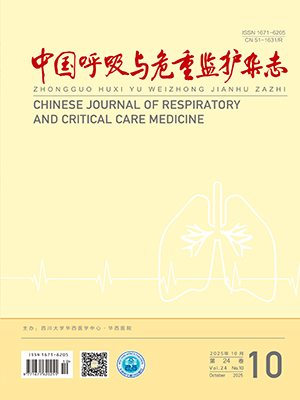| 1. |
Lorenz RR. Adult laryngotracheal stenosis: etiology and surgical management. Curr Opin Otolaryngol Head Neck Surg, 2003, 11(6): 467-472.
|
| 2. |
李时悦, 苏柱泉. 插管后气管狭窄的危险因素及其处理. 中华结核和呼吸杂志, 2014, 37(8): 561-562.
|
| 3. |
Wain JC. Postintubation tracheal stenosis. Semin Thorac Cardiovasc Surg, 2009, 21(3): 284-289.
|
| 4. |
叶俊, 方正, 李兵, 等. 经支气管镜介入治疗中心性气道狭窄. 中国呼吸与危重监护杂志, 2011, 10(4): 408-410.
|
| 5. |
李多, 王文军, 孙鼎强, 等. 血管介入联合气道介入治疗晚期中央型肺癌中心气道重度狭窄. 中国呼吸与危重监护杂志, 2017, 16(1): 74-77.
|
| 6. |
金发光, 傅恩清, 谢永宏, 等. 难治性中心气道狭窄的综合介入治疗. 中华结核和呼吸杂志, 2010, 33(1): 21-24.
|
| 7. |
李时悦. 良性中央气道狭窄的介入治疗方法选择. 中华结核和呼吸杂志, 2011, 34(5): 329-332.
|
| 8. |
LSMA. Textbook of respiratory medicine[M]. Philadelphia: Saunders, 1994.
|
| 9. |
Freitag L, Ernst A, Unger M, et al. A proposed classification system of central airway stenosis. Eur Respir J, 2007, 30(1): 7-12.
|
| 10. |
Bergler W, Honig M, Gotte K, et al. Treatment of recurrent respiratory papillomatosis with argon plasma coagulation. J Laryngol Otol, 1997, 111(4): 381-384.
|
| 11. |
谢冬, 姜格宁, 徐志飞, 等. 插管后气管狭窄的治疗进展. 中华胸心血管外科杂志, 2013, 29(3): 180-182.
|
| 12. |
苏柱泉, 魏晓群, 钟长镐, 等. 良性气管狭窄 158 例病因及介入治疗疗效分析. 中华结核和呼吸杂志, 2013, 36(9): 651-654.
|
| 13. |
Nouraei S A, Ghufoor K, Patel A, et al. Outcome of endoscopic treatment of adult postintubation tracheal stenosis. Laryngoscope, 2007, 117(6): 1073-1079.
|
| 14. |
Abbasidezfouli A, Shadmehr MB, Arab M, et al. Postintubation Multisegmental Tracheal Stenosis: Treatment and Results. Ann Thorac Surg, 2007, 84(1): 211-214.
|
| 15. |
Nouraei SA, Petrou MA, Randhawa PS, et al. Bacterial colonization of airway stents: a promoter of granulation tissue formation following laryngotracheal reconstruction. Arch Otolaryngol Head Neck Surg, 2006, 132(10): 1086-1090.
|
| 16. |
Rea F, Callegaro D, Loy M, et al. Benign tracheal and laryngotracheal stenosis: surgical treatment and results. Eur J Cardiothorac Surg, 2002, 22(3): 352-356.
|
| 17. |
Wain JC. Postintubation tracheal stenosis. Chest Surg Clin North Am, 2003, 13(2): 231-246.
|
| 18. |
Nouraei SA, Singh A, Patel A, et al. Early endoscopic treatment of acute inflammatory airway lesions improves the outcome of postintubation airway stenosis. Laryngoscope, 2006, 116(8): 1417-1421.
|




